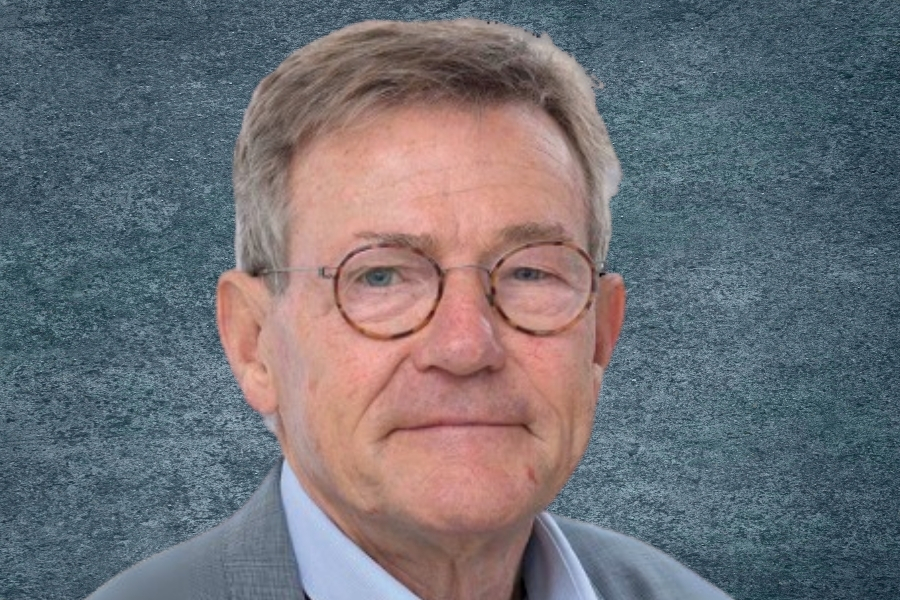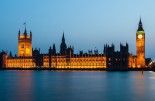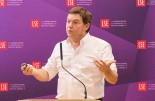Johan Van Overtveldt: Politics is the final piece, not the starting point
Johan Van Overtveldt: Politics is the final piece, not the starting point

This report was originally written in Dutch. This is an English translation.
Johan Van Overtveldt, economist and politician for the N-VA in Belgium, is a former journalist and editor, and part-time lecturer in Economic Thought at Hasselt University. He has a critical but passionate view of Europe and economic power. In this interview, he explains how the euro can only survive with further political integration and why he believes the current role of central banks poses a threat to democracy and economic stability.
By Harry Geels
You have had a rich career, both in politics and in business. Isn't that a contradiction?
That's a valid question, because conflicts of interest are obviously unacceptable. In practice, we see that things regularly go wrong in this area. Just look at how the American government and Big Tech seem to be intertwined. Nevertheless, there is a lot to be said for politicians gaining experience elsewhere, for example in business or journalism. Personally, I am happy with my previous experiences. I see politics as the final stage of my career, where my previous work and contacts stand me in good stead. It allows me to pick up on social developments more quickly.
A concrete example: due to automatic inflation adjustments, Belgium experienced higher inflation than most other EU countries. I immediately saw the negative impact on our competitive position and brought this up in political discussions. Career politicians are often less quick or less decisive in tackling issues like this. They often operate within a narrow or ideological framework. You can counteract the concentration of interests with good rules. Politicians should not be allowed to vote on issues in which they are involved in another capacity, for example within a private or semi-public organisation.
You have written no fewer than six books. What are the most important takeaways?
Let me start with “The End of the Euro”. My thesis is that the euro will not survive without further political integration. If this fails to materialise, sooner or later there will be a crisis that will spell the end of the euro.
The current defence debate may be a step towards political union. Having each Member State have its own army without coordination is unwise, especially given the geopolitical tensions. The Netherlands is wary of a European army, especially if it has to be financed by joint Eurobonds. But there is no alternative. Europe must integrate in order to remain competitive globally. Returning to a Thatcherite economic union is not an attractive option for me. Given the current withdrawal of the US, the rising power of China and Russia's belligerence, Europe must stand on its own two feet militarily. This means, among other things, that we should not be dependent on Musk's SpaceX.
At the same time, in order to become militarily independent, we should not simply throw around public money. The defence market can also come up with its own solutions, preferably locally financed and stimulated. Central banks have become increasingly dominant, with many unintended side effects. Current policy allows politicians to postpone necessary decisions.
And your book “The Chicago School”?
“That book, subtitled 'How the University of Chicago Assembled the Thinkers Who Revolutionised”, took me the most work of any book I have written. But it was worth it because it has brought me so much in terms of knowledge and contacts. It would be nice to write a sequel to it someday, perhaps after my political career. The school's thinking is critical of overregulation and the growing role of central banks. Central banks have become increasingly dominant, with many unintended side effects. Current policy allows politicians to postpone necessary decisions. “Whatever it takes” has been politically abused: we continue to spend because the central bank is standing by.
My latest book, “The Icarus Curse, How Western Democracies Derailed and How to Get Back on Track”, is a logical follow-up to this. In it, I explain where social discontent comes from. The basis of this discontent lies in the way governments have misused John Maynard Keynes' theories to gain an ever greater role. They apply the Keynesian principle of spending during recessions, but forget the necessary downsizing or austerity measures in good times. I dare say that excessive confidence in policy has led to recklessness and decadence within Western democracies. I believe that we should organise our society much more according to the principles of the free market, something I also advocate in another book, “Red de vrije markt” (Save the free market).
If Keynes were to look at society today, he would turn in his grave. At a conference, he once sighed: “Oh my God, I was the only non-Keynesian in the room.” Later, he said that the way his theory was being applied was unsustainable and would lead to inflation and destabilisation. I fear that he is gradually being proven right.
Trump's plans to make American government bonds unattractive – for example, by converting them into perpetual low-interest loans – are downright dangerous.
Wasn't that the same conference where he sang the praises of Adam Smith?
'Exactly. It is remarkable that politicians are continuing on a course that Keynes himself rejected. Even economists such as Milton Friedman failed to bring politicians to their senses. The result is what we see today: when real crises arise, such as the need for rearmament, there is no budgetary leeway. This is called policy exhaustion, the Icarus curse. We then resort to artificial measures, such as not applying the Stability and Growth Pact or issuing Eurobonds.
I met Friedman three times, including in connection with my book on the Chicago School. I do not agree with him on all points. His view of the minimal role of central banks and government is too limited. Friedman believes, for example, that central banks should only allow the money supply to grow in line with economic growth. Adam Smith saw more roles for the government, for example in education. Smith also attached great importance to the ethics of entrepreneurship. He even considered his “Theory of Moral Sentiments” more important than “The Wealth of Nations”.
In my Economic Thought lectures, I discuss all these thinkers and see how their theories are distorted or denounced in practice. Take Joseph Schumpeter: “creative destruction” is almost a taboo word these days. We want to eliminate all risks, especially in Europe, but that stifles innovation and resilience.
It seems as if the new Trump administration wants to reverse all that.
That's true, but it's far too radical. You can't turn a society upside down overnight. That causes resistance and confusion. Incidentally, the US is much more built on the principle of “best of the best” and creative destruction than Europe. An American who loses his job will set to work to improve his situation. In Europe, people first look to the state. I think that's why we're lagging behind in areas such as technology, communication and defence. At the same time, Europe is more humane, with better social safety nets.
I also see the new American administration taking the wrong steps in terms of policy. Trump's plans to make American government bonds unattractive, for example by converting them into perpetual low-interest loans, are downright dangerous. It could undermine global confidence in the financial system, because American government bonds are a fundamental pillar of our global system. I would call it “Waconomics”.
Governments apply the Keynesian principle of spending during recessions, but forget to scale back or cut spending when times are good.
In your role as Chairman of the Budget, you have been critical of the accountability of EU spending.
'Indeed. OLAF, the European anti-fraud agency, is currently investigating 300 complaints about spending from the coronavirus recovery fund. During the infamous summit on the recovery fund in the summer of 2020, where five small, frugal countries, led by Mark Rutte, protested for days, it was decided that the EU countries themselves would monitor spending. Fortunately, we were able to get some control mechanisms in place at the time, but they remain inadequate. Unfortunately, accountability for spending is far from perfect. My position is that the fraud in those 300 cases has been more or less proven or will be proven. That is, of course, a great shame. If we are going to finance rearmament in the same way, it would be a huge mockery of the EU and an insult to all EU citizens.
As chair of the budget committee, I regularly feel uncomfortable. In general, there need to be many more control mechanisms on spending, including in other areas, such as agricultural subsidies. I understand that fraud cases like this play into the hands of EU critics.
Despite this problem, which I fight against every day, I believe that the advantages of the EU still outweigh the disadvantages. However, the balance is slowly tipping in the wrong direction, not only because of fraud cases, but also because of all kinds of unnecessary bureaucratic rules. Frans Timmermans' Green Deal, however well-intentioned, has also done much more harm than good. It placed a disproportionate burden on the entire European economy, which would have resulted in the loss of all kinds of other important things, such as prosperity, innovation and healthy finances.
What are your plans for the future?
As I said, I want to write a sequel to my book on the Chicago School. I will also be retiring in a few years, and I really intend to spend more time with my wife, children and grandchildren. I am trying to do my bit to create a better world for them. But I also want to enjoy them more.
|
Johan Van Overtveldt Johan Van Overtveldt holds a PhD in Applied Economic Sciences (UA) and an MBA from the Catholic University of Leuven. He has worked in journalism and business, and was twice editor-in-chief of Trends and Knack. Since 2012, he has been teaching macroeconomics at Hasselt University. In 2013, he entered politics as economic advisor to the N-VA. He was Minister of Finance in the Michel I government (2014–2018) and was re-elected as a Member of the European Parliament in 2019. |











